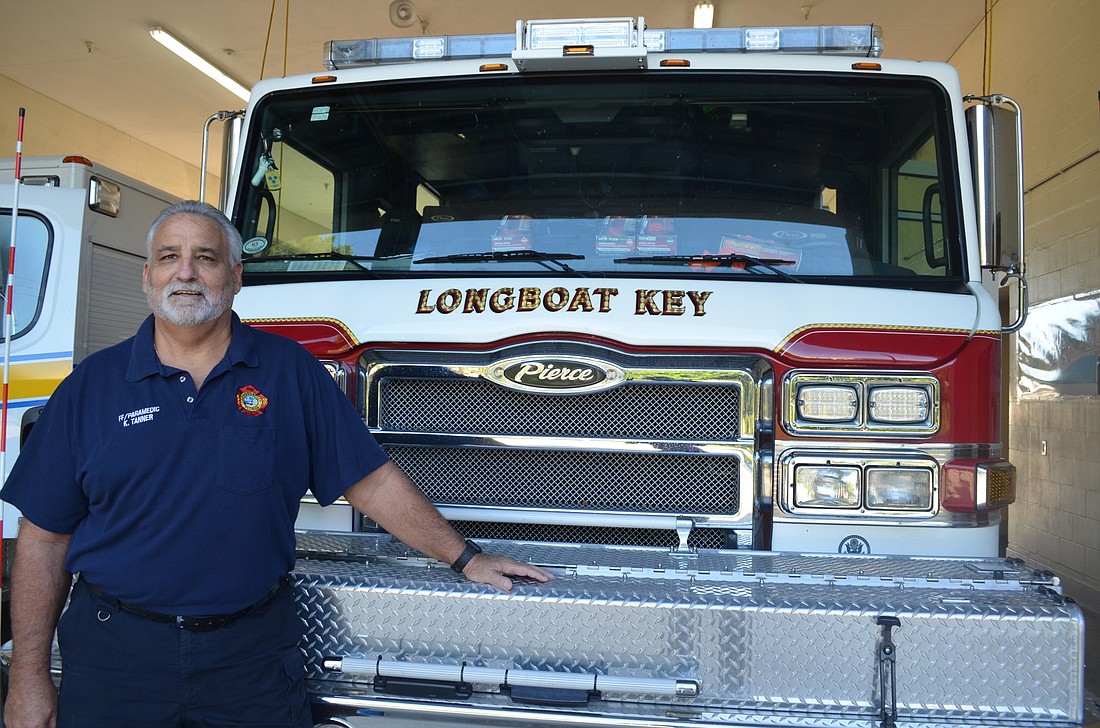- April 23, 2024
-
-
Loading

Loading

T
he town offered firefighters an average raise of 11.02% as part of a three-year contract.
Instead, firefighters rejected that and approved another proposal from the town that cuts their pay by an average of 1.1% for the remainder of the fiscal year, which ends Sept. 30.
So why does Longboat Key Fire Rescue Lt. Keith Tanner, the district vice president of the firefighter union who signed the agreement on the union’s behalf, call it a “win-win for both sides?”
During negotiations, firefighters offered to eliminate the town’s proposed raises to reduce their Florida Retirement System contribution from about 14% of their salaries to the 3% contribution the state requires of all employees enrolled in FRS.
But that could expose the town — and taxpayers — to more pension risk after overhauling its retirement plans several years ago, according to some past commissioners.
The contract that firefighters approved Friday would also reinstate a step increase system that the town suspended in 2008, meaning that when the town’s new fiscal year begins Oct. 1, salaries would rise by an average 2.7%. Wages would increase another 3.9% in FY 2018.
“We’re comfortable with the proposal that was made,” said Vice Mayor Terry Gans. “I think it’s responsible, and I think it will serve us well in the future.”
Commissioners originally opposed limiting firefighters’ contribution to 3%.
About three years earlier, the commission wanted to address the town’s combined pension liability of approximately $27 million for its three employee pension funds and began working to freeze the plans and transition employees to defined contribution plans in 2012 and 2013.
General employees and police eventually shifted to 401(k)s. But firefighters fought to maintain a defined benefit plan.
Eventually, the town and firefighters agreed to a contract that included freezing the town’s pension and enrolling firefighters in the FRS plan. It split the required employer contribution while capping the town’s contribution at 13% — a move designed to balance firefighters’ desire to maintain a defined benefit retirement plan and the town’s goal of limiting its future pension liability.
As a result, Longboat Key Fire Rescue became the only department in the state to require its employees to contribute more than the state-mandated 3%.
Former Mayor Jim Brown said because the Florida Legislature ultimately decides the amount municipalities pay into FRS, the town was putting itself at risk.
“We all fought hard to get it to where it is, and it’s a shame that the town is changing that,” Brown said.
Former Commissioner Lynn Larson said the move unravels the work the commission accomplished during the last round of negotiations in 2012 and 2013.
“I really do feel like we got taken advantage of,” said Larson, who also criticized reinstating step increases as rewarding longevity instead of hard work. “It was a trap, and I sold it to the other commissioners.”
But during the last year-and-a-half of negotiations, union representatives said that the high required contributions made it difficult to draw qualified new hires, saying that the department interviewed just six candidates for six open positions because the town was not competitive.
“I think the department out here is definitely going to be able to hire people with more experience, and I definitely think they’ll be able to retain those employees once they hire them,” Tanner said.
Gans said the salary concession firefighters offered made the deal tenable, but he acknowledged potential issues with FRS contributions.
“We’re certainly aware of it, have our eyes open on it and we’re paying attention to it,” Gans said.
Town Manager Dave Bullock estimated the deal will save the town $230,000 over the next three years compared with a draft contract firefighters presented the town in April. The savings is mainly due to the fact that a dollar in wages is more expensive than a dollar in FRS contributions. Bullock said when the town factors in Social Security, Medicaid and other benefits, taking on a larger burden in pension funding is viable.
“My ultimate measure here is the service to the community,” Bullock said. “And I think we’ll be able to maintain the service level we want and get the people who are well-trained and interact well with our population.”
The commission considered the contract during a closed meeting two weeks ago and is slated to vote on the contract at its June 6 regular meeting.
“I think they finally realized they needed to do something to make themselves competitive again, and we’ve been telling them that for the last 14 months,” Tanner said before the ratification Friday. “I think they knew all along they had a problem, but it’s just part of negotiations. It goes back and forth until you come to a middle ground both sides can live with.”